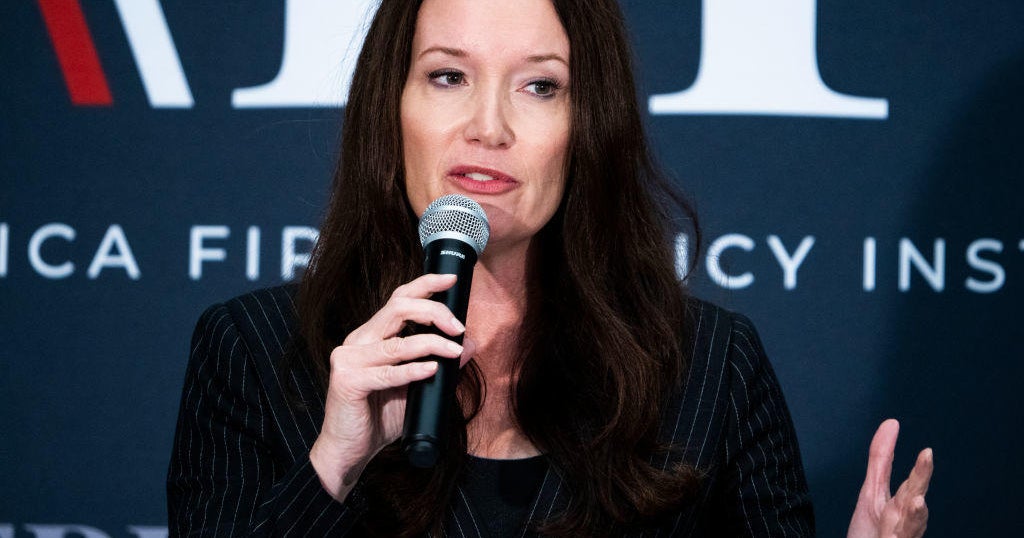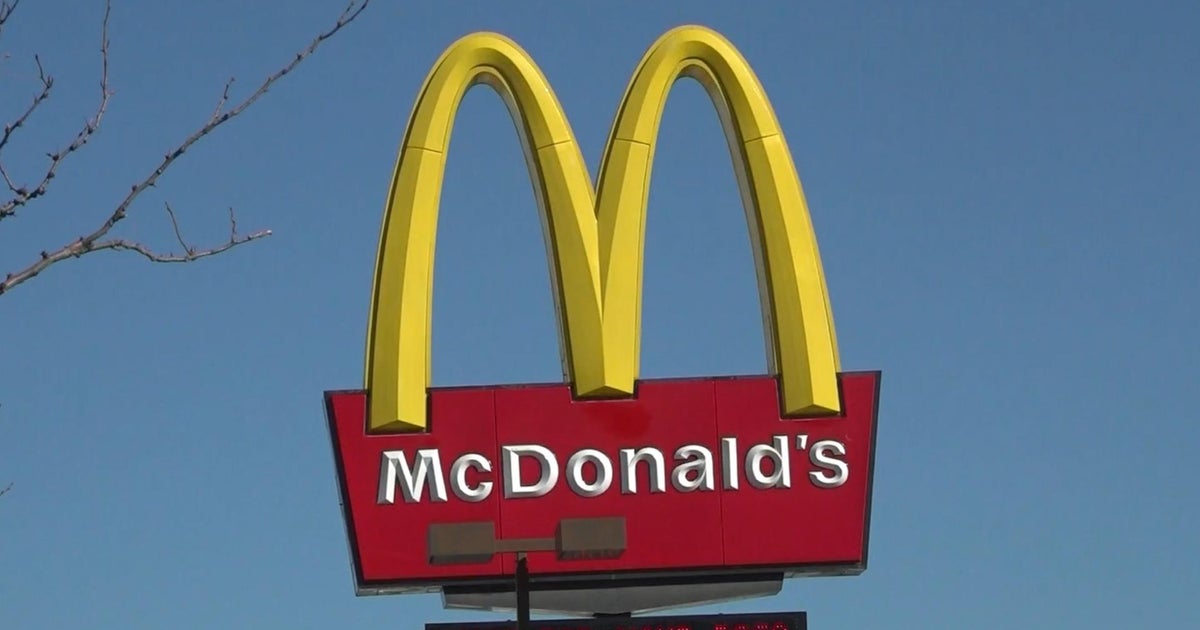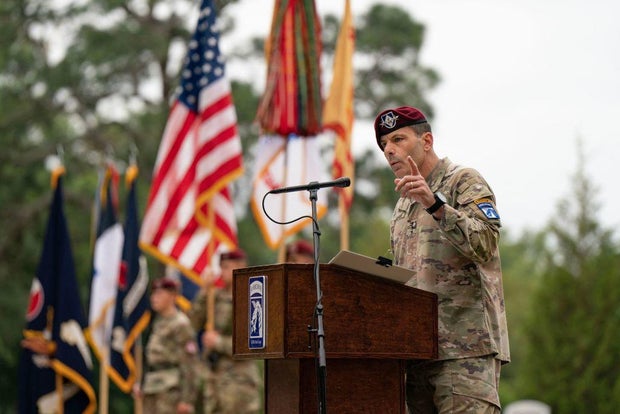CBS News
Boeing accepts plea deal stemming from 737 Max crashes

Boeing will plead guilty to a criminal fraud charge stemming from two crashes of 737 Max jetliners that killed 346 people after the government determined the company violated an agreement that had protected it from prosecution for more than three years, the Justice Department said Sunday night. The aerospace giant then confirmed that it had agreed to the deal.
Federal prosecutors gave Boeing the choice last week of entering a guilty plea and paying a fine as part of its sentence or facing a trial on the felony criminal charge of conspiracy to defraud the United States.
Prosecutors accused the American aerospace giant of deceiving regulators who approved the airplane and pilot-training requirements for it.
The plea deal, which still must receive the approval of a federal judge to take effect, calls for Boeing to pay an additional $243.6 million fine. That was the same amount it paid under the 2021 settlement that the Justice Department said the company breached. An independent monitor would be named to oversee Boeing’s safety and quality procedures for three years. The deal also requires Boeing to invest at least $455 million in its compliance and safety programs.
The plea deal covers only wrongdoing by Boeing before the crashes, which killed all 346 passengers and crew members aboard two new Max jets. It does not give Boeing immunity for other incidents, including a panel that blew off a Max jetliner during an Alaska Airlines flight in January, a Justice Department official said.
The deal also does not cover any current or former Boeing officials, only the corporation. In a statement, Boeing confirmed it had reached the deal with the Justice Department but had no further comment.
In a court filing Sunday night, the Justice Department said it expected to file the written plea agreement with the court by July 19. Lawyers for some of the relatives of those who died in the two crashes have said they will ask the judge to reject the agreement.
“This sweetheart deal fails to recognize that because of Boeing’s conspiracy, 346 people died. Through crafty lawyering between Boeing and DOJ, the deadly consequences of Boeing’s crime are being hidden,” said Paul Cassell, a lawyer for some of the families.
Federal prosecutors alleged Boeing committed conspiracy to defraud the government by misleading regulators about a flight-control system that was implicated in the crashes, which took place in Indonesia in October 2018 and in Ethiopia less five months later.
As part of the January 2021 settlement, the Justice Department said it would not prosecute Boeing on the charge if the company complied with certain conditions for three years. Prosecutors last month alleged Boeing had breached the terms of that agreement.
The company’s guilty plea will be entered in U.S. District Court in Texas. The judge overseeing the case, who has criticized what he called “Boeing’s egregious criminal conduct,” could accept the plea and the sentence that prosecutors offered with it or he could reject the agreement, likely leading to new negotiations between the Justice Department and Boeing.
Relatives of the people who died in the crashes were briefed on the plea offer a week ago and at the time said they would ask the judge to reject it.
U.S. agencies can use a criminal conviction as grounds to exclude companies from doing business with the government for a set amount of time. Boeing is an important contractor of the Defense Department and NASA.
The case goes back to the crashes in Indonesia and in Ethiopia. The Lion Air pilots in the first crash did not know about flight-control software that could push the nose of the plane down without their input. The pilots for Ethiopian Airlines knew about it but were unable to control the plane when the software activated based on information from a faulty sensor.
The Justice Department charged Boeing in 2021 with deceiving FAA regulators about the software, which did not exist in older 737s, and about how much training pilots would need to fly the plane safely. The department agreed not to prosecute Boeing at the time, however, if the company paid a $2.5 billion settlement, including the $243.6 million fine, and took steps to comply with anti-fraud laws for three years.
Boeing, which blamed two low-level employees for misleading the regulators, tried to put the crashes behind it. After grounding Max jets for 20 months, regulators let them fly again after the Boeing reduced the power of the flight software. Max jets logged thousands of safe flights and orders from airlines picked up, increasing to about 750 in 2021, about 700 more in 2022 and nearly 1,000 in 2023.
The company based in Arlington, Virginia, has dozens of airline customers spanning the globe. The best customers for the 737 Max include Southwest, United, American, Alaska, Ryanair and flydubai.
That changed in January, when a panel covering an unused emergency exit blew off a Max during the Alaska Airlines flight over Oregon.
Pilots landed the 737 Max safely and no one was seriously injured, but the incident led to closer scrutiny of the company. The Justice Department opened a new investigation, the FBI told passengers on the Alaska plane that they might be victims of a crime and the FAA said it was stepping up oversight of Boeing.
A criminal conviction could jeopardize Boeing’s status as a federal contractor, according to some legal experts. The plea announced Sunday does not address that question, leaving it to each government agency whether to bar Boeing.
The Air Force cited “compelling national interest” in letting Boeing continue competing for contracts after the company paid a $615 million fine in 2006 to settle criminal and civil charges, including that it used information stolen from a rival to win a space-launch contract.
The company has 170,000 employees and 37% of its revenue last year came from U.S. government contracts. Most of it was defense work, including military sales that Washington arranged for other countries.
Even some Boeing critics have worried about crippling a key defense contractor.
“We want Boeing to succeed,” Richard Blumenthal, a Connecticut Democrat, said during a Senate hearing last month on what he termed the company’s broken safety culture. “Boeing needs to succeed for the sake of the jobs it provides, for the sake of local economies it supports, for the sake of the American traveling public, for the sake of our military.”
Relatives of the Indonesia and Ethiopia crash victims have pushed for a criminal trial that might illuminate what people inside Boeing knew about deceiving the FAA. They also wanted the Justice Department to prosecute top Boeing officials, not just the company.
“Boeing has paid fines many a time, and it doesn’t seem to make any change,” said Ike Riffel of Redding, California, whose sons Melvin and Bennett died in the Ethiopian Airlines crash. “When people start going to prison, that’s when you are going to see a change.”
At a recent Senate hearing, Boeing CEO David Calhoun defended the company’s safety record after turning and apologizing to Max crash victims’ relatives seated in the rows behind him “for the grief that we have caused.”
Hours before the hearing, the Senate investigations subcommittee released a 204-page report with new allegations from a whistleblower who said he worried that defective parts could be going into 737s. The whistleblower was the latest in a string of current and former Boeing employees who have raised safety concerns about the company and claimed they faced retaliation as a result.
CBS News
Compromise deal reached at COP29 climate talks for $300 billion a year to poor nations

Countries agreed on a deal to inject at least $300 billion annually in humanity’s fight against climate change, aimed at helping poor nations cope with the ravages of global warming at tense United Nations climate talks in the city where industry first tapped oil.
The $300 billion will go to developing countries who need the cash to wean themselves off the coal, oil and gas that causes the globe to overheat, adapt to future warming and pay for the damage caused by climate change’s extreme weather. It’s not near the full amount of $1.3 trillion that developing countries were asking for, but it’s three times the $100 billion a year deal from 2009 that is expiring. Delegations said this deal is headed in the right direction, with hopes that more money flows in the future.
“Everybody is committed to having an agreement,” Fiji delegation chief Biman Prasad said as the deal was being finalized. “They are not necessarily happy about everything, but the bottom line is everybody wants a good agreement.”
It’s also a critical step toward helping countries on the receiving end create more ambitious targets to limit or cut emissions of heat-trapping gases that are due early next year. It’s part of the plan to keep cutting pollution with new targets every five years, which the world agreed to at the U.N. talks in Paris in 2015.
The Paris agreement set the system of regular ratcheting up climate fighting ambition as away to keep warming under 1.5 degrees Celsius above pre-industrial levels. The world is already at 1.3 degrees Celsius and carbon emissions keep rising.
Countries also anticipate that this deal will send signals that help drive funding from other sources, like multilateral development banks and private sources. That was always part of the discussion at these talks — rich countries didn’t think it was realistic to only rely on public funding sources — but poor countries worried that if the money came in loans instead of grants, it would send them sliding further backward into debt that they already struggle with.
“The $300 billion goal is not enough, but is an important down payment toward a safer, more equitable future,” said World Resources Institute President Ani Dasgupta. “This deal gets us off the starting block. Now the race is on to raise much more climate finance from a range of public and private sources, putting the whole financial system to work behind developing countries’ transitions.”
It’s more than the $250 billion that was on the table in the first draft of the text, which outraged many countries and led to a period of frustration and stalling over the final hours of the summit. After an initial proposal of $250 billion a year was soundly rejected, the Azerbaijan presidency brewed up a new rough draft of $300 billion, that was never formally presented, but also dismissed roundly by African nations and small island states, according to messages relayed from inside.
The several different texts adopted early Sunday morning included a vague but not specific reference to last year’s Global Stocktake approved in Dubai. Last year there was a battle about first-of-its-kind language on getting rid of the oil, coal and natural gas, but instead it called for a transition away from fossil fuels. The latest talks only referred to the Dubai deal, but did not explicitly repeat the call for a transition away from fossil fuels.
Countries also agreed on the adoption of Article 6, creating markets to trade carbon pollution rights, an idea that was set up as part of the 2015 Paris Agreement to help nations work together to reduce climate-causing pollution. Part of that was a system of carbon credits, allowing nations to put planet-warming gasses in the air if they offset emissions elsewhere. Supporters said a U.N.-backed market could generate up to an additional $250 billion a year in climate financial aid.
Despite its approval, carbon markets remain a contentious plan because many experts say the new rules adopted don’t prevent misuse, don’t work and give big polluters an excuse to continue spewing emissions.
“What they’ve done essentially is undermine the mandate to try to reach 1.5,” said Tamara Gilbertson, climate justice program coordinator with the Indigenous Environmental Network. Greenpeace’s An Lambrechts, called it a “climate scam” with many loopholes.
With this deal wrapped up as crews dismantle the temporary venue, many have eyes on next year’s climate talks in Belem, Brazil.
CBS News
GOP senator blocks promotion of general involved in Afghanistan withdrawal, sources say

The promotion of a three-star general who was part of the 2021 U.S. withdrawal from Afghanistan has been paused by Republican Sen. Markwayne Mullin of Oklahoma, three sources familiar with the move confirmed to CBS News Saturday.
Lt. Gen. Christopher Donahue was slated to be promoted to a four-star rank and take command of the U.S. Army in Europe. However, he was not included in a batch of nearly 1,000 promotions that moved through the Senate Armed Services Committee this week despite receiving a Pentagon recommendation.
Mullin has put a hold on the promotion. The intention is to allow for the new Republican-controlled Congress and President-elect Donald Trump to weigh in on the promotion given Donahue’s involvement in the Afghanistan withdrawal, two sources familiar with the situation told CBS News.
Behind the scenes, there is an effort underway by the Army and other allies to convince Congress to move forward and lift the hold, which appears to be politically motivated, sources said.
ALLISON JOYCE/AFP via Getty Images
During the campaign, Trump frequently mentioned his surprise that no officers were consequently fired by President Biden for the chaotic withdrawal.
Military officers execute U.S. policy but do not create it. It was the Trump administration that in February 2020 brokered the deal with the Taliban to withdraw U.S. forces from Afghanistan, but it was Mr. Biden who decided to execute that withdrawal despite the Taliban breaking the terms of that U.S. agreement.
Donahue was the last U.S. soldier to exit Afghanistan in 2021. The U.S. evacuated about 125,000 people, including 6,000 Americans, over the course of its withdrawal, during which dozens of Afghans and 13 U.S. service members were killed in a suicide bombing outside Hamid Karzai airport in Kabul.
The U.S. underestimated the speed with which the Taliban would capture Kabul and the well-documented U.S. logistical and planning failures have been a focus of multiple internal probes at the Pentagon, State Department, and in Congress.
An extensive State Department report released last year found that “insufficient” planning, communication failures and an inability to grasp “the scale and scope of the operation” contributed to the chaotic operation.
CBS News has reached out to Mullin’s office but did not receive a response. It is not clear whether Trump is aware of the hold.
contributed to this report.
CBS News
Trump picks former White House aide Brooke Rollins to lead the USDA

President-elect Donald Trump said Saturday that he will nominate former White House aide Brooke Rollins to be his agriculture secretary, the last of his picks to lead executive agencies and another choice from within his established circle of advisers and allies.
The nomination must be confirmed by the Senate, which will be controlled by Republicans when Trump takes office Jan. 20, 2025. Rollins would succeed Tom Vilsack, President Biden’s agriculture secretary who oversees the sprawling agency that controls policies, regulations and aid programs related to farming, forestry, ranching, food quality and nutrition.
Rollins, who graduated from Texas A&M University with a degree in agricultural development, is a longtime Trump associate who served as his former domestic policy chief. She is president and CEO of the America First Policy Institute, a group helping to lay the groundwork for a second Trump administration.
Tom Williams/CQ-Roll Call, Inc via Getty Images
Rollins, 52, previously served as an aide to former Texas Gov. Rick Perry and ran a think tank, the Texas Public Policy Foundation.
Rollins’ pick completes Trump’s selection of the heads of executive branch departments, just two and a half weeks after the former president won the White House once again. Several other picks that are traditionally Cabinet-level remain, including U.S. Trade Representative and head of the Small Business Administration.
Trump didn’t offer many specifics about his agriculture policies during the campaign, but farmers could be affected if he carries out his pledge to impose widespread tariffs. During the first Trump administration, countries like China responded to Trump’s tariffs by imposing retaliatory tariffs on U.S. exports like the corn and soybeans routinely sold overseas. Trump countered by offering massive multibillion-dollar aid to farmers to help them weather the trade war.
President Abraham Lincoln founded the USDA in 1862, when about half of all Americans lived on farms. The USDA oversees multiple support programs for farmers; animal and plant health; and the safety of meat, poultry and eggs that anchor the nation’s food supply. Its federal nutrition programs provide food to low-income people, pregnant women and young children. And the agency sets standards for school meals.
Robert F. Kennedy Jr., Trump’s nominee to lead the Department of Health and Human Services, has vowed to strip ultraprocessed foods from school lunches and to stop allowing Supplemental Nutrition Assistance Program beneficiaries from using food stamps to buy soda, candy or other so-called junk foods. But it would be the USDA, not HHS, that would be responsible for enacting those changes.
In addition, HHS and USDA will work together to finalize the 2025-2030 edition of the Dietary Guidelines for Americans. They are due late next year, with guidance for healthy diets and standards for federal nutrition programs.










